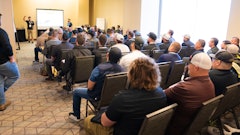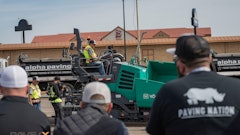There have been many instances of sweeping contractors signing the “standard” contracts supplied by third-party vendors (also known as national service providers) and then finding out — too late — that certain clauses have them incurring significant liability they didn’t recognize prior to signing.
When you sign any third-party vendor contract be sure you understand that all of its clauses were put into it primarily to protect the interests of the entity that’s providing the agreement, not yours! If you don’t agree with a particular clause, be sure to cross it out, initial the cross-out, and make sure the third party provides you with a copy they have also initialed. Do not make the mistake so many contractors have made -- to just think “they probably wouldn’t do that.” If they didn’t intend to enforce a clause, it would not be in the contract.
And make sure the contract you’re signing pays you enough money to make a profit. Third-party vendors often specify an amount they expect to pay for the needed sweeping. Often, it is intentional that these amounts are unrealistically low. Know your costs such that you can tell for certain whether a contract amount will cover your fixed and variable costs, as well as earn your company a normal profit. If it won’t, then either: a) negotiate a better price per sweep (or reduce requirements so as to reduce time needed to perform the work), or b) let a competitor lose money on the account instead of you doing so.
Beware of contracts that include:
1. Complete indemnification (hold harmless) for any problems (think slip-and-fall) that might occur on the property. With this type of contract clause, the sweeping contractor may be held responsible for any number of things that happen on the property regardless of when they last swept the lot. Some clauses not only allow the sweeping company to be named in liability claims, but even make the contractor’s insurance be the primary, taking effect before any other liability coverage. A sweeping contractor might say that they’ll do their best to be the “eyes and ears” of the property owner, but that shouldn’t mean you should be expected to become the client’s insurance company!
2. A “pay when paid” or “pay if paid” clause. As a contractor there’s virtually no way to know when a third-party client was paid for your services — or even if they were paid. A contractor’s creditors are not going to care if the third-party provider was paid or not; they just want the money you owe them. Note that these types of clauses are illegal in some states.
3. No allowance for direct client communication. Many third-party vendors do not want the contractor that is providing services to speak directly with the actual client. Although usually not a deal-breaker, such a contract clause makes it difficult to respond promptly to a client’s needs, especially in an emergency.
4. A non-compete clause for the entire chain of similar stores the third-party vendor has under contract (even if you don’t now sweep them), not just the one location you would be sweeping. Third-party vendors can and do lose accounts. Some contracts specify that in the event the third party loses the account, the current contractor cannot take it over. Also be aware of a non-compete clause for any business or chain of stores the third-party vendor has solicited for its business. Such a clause means that to take on any new client, the contractor must contact the third-party vendor to ask whether they have ever contacted the prospective client. If they say they have, the contractor is prohibited to take on the client. (We know of one contractor who was advised by the company attorney that they had to contact a particular third-party vendor, with whom they’d signed such a contract, prior to taking on any new client located within 70 miles of their location!).
5. Clauses that make a sweeping contractor responsible for lot condition when they did not sweep the previous day/night. Parking lots can become trashed at any time; don’t accept a contract that makes you liable for doing a ‘re-sweep’ or, even worse, liable for safety issues, when the problem debris occurs on days when you didn’t sweep or haven’t swept very recently.
6. A very short cancellation clause. Ideally, contracts should offer no shorter than a 30-day cancellation clause, and it should be worded that cancellation needs to be “for cause”. Some third-party vendor contracts allow immediate dismissal of the contractor but require that a 30-day notice be given to the third-party company if the contractor wants to quit.
7. A clause allowing client to reduce the sweeping days per week at their discretion. If you have such a clause and such a reduction occurs, you will be obligated to continue sweeping at your same rate per sweep, with no ability to increase your price per sweep.
8. Refusal to pay for the service in the event the third-party vendor had a billing app that was down at the time of service. These days, some third-party companies have designed their own billing app that must be used while on the client property. Although you may be able to teach your sweeper operator to use the app, when/if the app is down it is likely they won’t be able to handle any specified workaround. The result: You don’t get paid for that night’s sweep.
9. Wording to the effect that the contract is “governed and construed in accordance with” laws in a state other than yours. This might negate your ability to file a lien in your state, as well. Keep in mind when signing that if a contract requires that any litigation be done in a distant state, there will be much higher costs in doing so. This is even more onerous if you can’t even file a lien in your state but must do so in the third party’s state of operation.
10. A clause that makes your company liable for any work you subcontract at the request of the third party or client. When you recommend or hire another company to provide services your company does not, be sure your initial contract doesn’t make you liable for any mistakes the subcontractor might make or accidents that occur.
The preceding are all examples of contract issues that have been provided to the World Sweeping Association over time. They are intended to provide guidelines about contract issues you may want to discuss with a qualified business attorney in your state(s) of operation and should not be construed as being legal advice.
Ranger Kidwell-Ross is editor of Worldsweeper.com, as well as founder and executive director of the World Sweeping Association. WSA provides its members with a listing of all known third-party providers, including a comments section where ongoing issues with any given provider can be included and/or discussed. For information about WSA visit www.WorldSweepingPros.com.




























